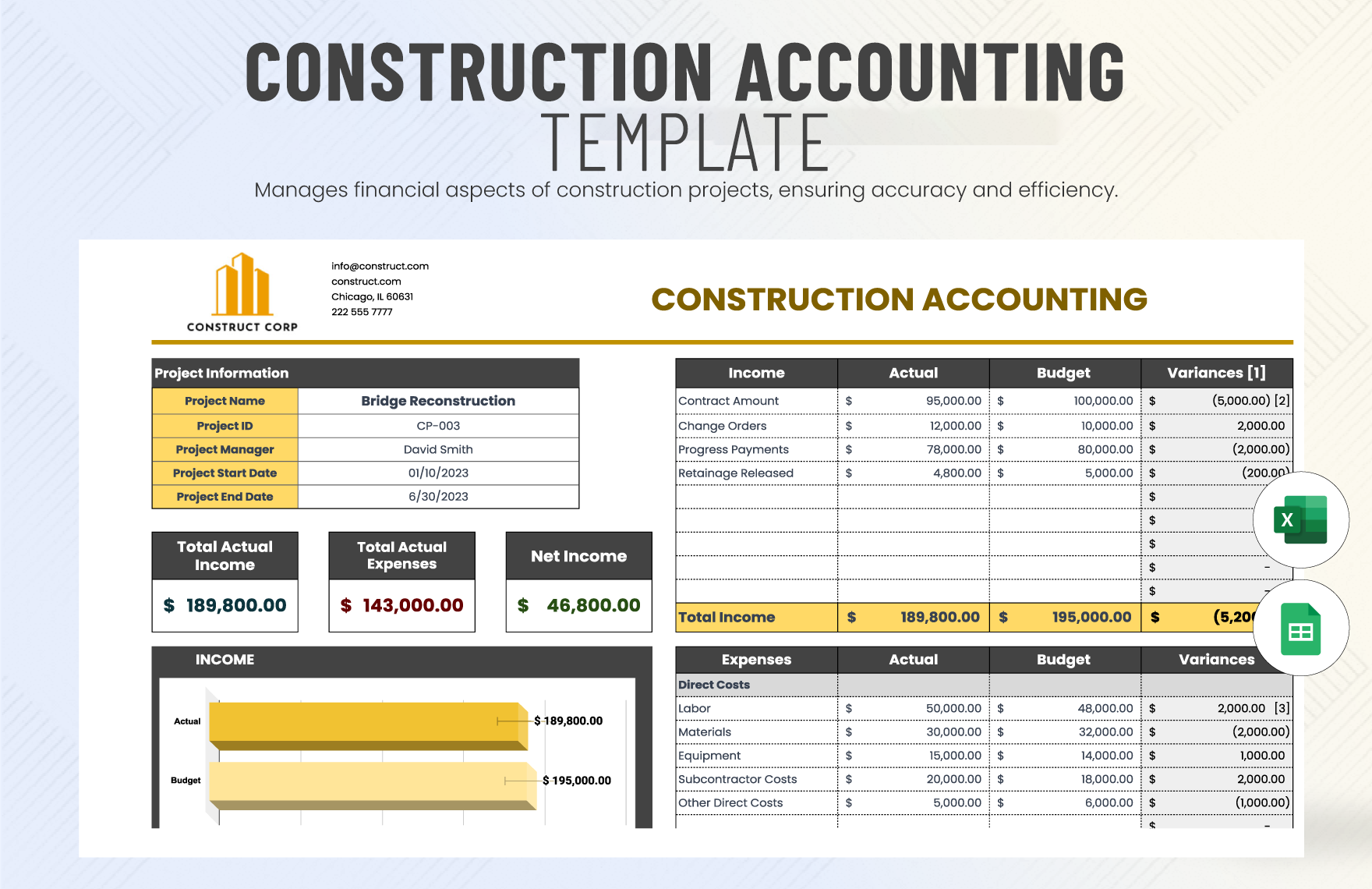Why Construction Accounting is Crucial for Long-Term Business Growth
Why Construction Accounting is Crucial for Long-Term Business Growth
Blog Article
Recognizing the Relevance of Construction Bookkeeping for Successful Task Administration

Role of Building Accounting
Construction audit works as the foundation of financial management in the construction market, making certain that projects are finished within spending plan and financial objectives are satisfied. construction accounting. This customized accountancy method addresses the special difficulties faced in building and construction projects, including differing job periods, rising and fall prices, and multiple stakeholders
Among the primary roles of building bookkeeping is to supply exact expense evaluation and tracking throughout the job lifecycle. This helps with enlightened decision-making, making it possible for job supervisors to readjust sources and timelines properly. In addition, building and construction audit enhances cash money flow management by checking accounts receivable and payable, thus making certain that funds are available for timely payments to providers and subcontractors.
It furnishes job supervisors with the necessary monetary information to prepare in-depth monetary declarations, which are vital for audits and economic testimonials. Eventually, the role of building accountancy prolongs past mere financial tracking; it is integral to critical planning and functional effectiveness, driving the success of building and construction jobs in an affordable landscape.
Trick Components of Building Accountancy

Budgeting develops an economic structure that overviews project implementation, enabling managers to allot sources efficiently and anticipate potential economic difficulties. Precise expense tracking is important for monitoring expenses in real-time, aiding to recognize variations between predicted and real prices. This allows prompt modifications to maintain the project on spending plan.
In addition, monetary coverage gives stakeholders with a clear image of the job's economic wellness. Regular records, such as profit and loss statements and cash money flow analyses, assist in informed decision-making and improve transparency amongst all events involved.
In addition, compliance with sector regulations and accounting standards is vital. This guarantees that economic practices are not only efficient however additionally authorized, guarding the organization versus lawful effects. By incorporating these essential parts, construction bookkeeping promotes an organized method to managing financial resources, inevitably adding to the successful completion of building and construction jobs.
Advantages for Task Supervisors
Leveraging efficient building accountancy practices gives task managers with a multitude of benefits that enhance both operational efficiency and financial oversight. One significant benefit is improved budget plan monitoring. Accurate monitoring of expenses and profits permits project managers to keep an eye on economic performance in real time, making certain projects continue to be within spending plan and assisting in timely adjustments when necessary.
In addition, building and construction accountancy streamlines cash circulation monitoring, allowing job supervisors to anticipate economic requirements and maximize resource allotment. By comprehending cash money inflows and discharges, they can better take care of repayments to suppliers, workers, and subcontractors, thus avoiding pricey delays.
Furthermore, durable audit systems supply comprehensive coverage capacities. Task supervisors can generate reports that use understandings right into job productivity, cost variances, and source usage. This data-driven technique fosters informed decision-making, allowing supervisors to determine potential issues proactively and implement corrective steps.
Finally, adherence to construction accountancy standards guarantees compliance with regulatory and legal needs, lessening the danger of conflicts or fines. Generally, effective construction audit outfits task supervisors with the devices needed to drive task success, boost stakeholder self-confidence, and promote long-term organizational development.
Common Obstacles in Construction Accounting
Several project managers experience substantial obstacles in construction accountancy that can hinder job success. Among the main difficulties is the complexity of tracking multiple job websites, each with distinctive budgets, timelines, and source allowances. This needs precise attention to detail, which can be frustrating without a robust bookkeeping system in position.
Furthermore, changing material costs and labor prices can make complex spending plan administration, making precise forecasting hard. Task supervisors usually battle to fix up these expenses with real expenditures, bring about possible financial inconsistencies.
Moreover, building and construction audit involves conformity with different regulations, consisting of tax obligations and labor legislations. Browsing these guidelines can be complicated, specifically for supervisors that may not have a strong accounting history.
One more considerable obstacle is handling cash money flow, which is vital in the construction sector. Delays in invoicing, repayments from customers, or unexpected task changes can create capital lacks, jeopardizing the job's progression.
Finally, reliable communication between task managers, accountants, and area groups is important. Misconceptions can result in unreliable financial reporting, additionally making complex project administration efforts. Addressing these difficulties proactively is essential for successful building accountancy.

Best Practices for Effective Accounting
While browsing the intricacies of building and construction audit can be daunting, adopting finest methods can substantially improve monetary administration and task success. One fundamental technique is keeping timely and exact documents. Carrying out durable accountancy software application tailored to construction tasks can improve data access, invoicing, and coverage, conserving and reducing errors time.
Furthermore, developing a clear spending plan and normal tracking against this spending plan are crucial. Employing a system of regular monetary evaluations permits task managers to identify variations early, assisting in timely decision-making. It is also necessary to different project expenses into straight and indirect classifications, enabling clearer understandings into productivity.
One more finest method entails promoting open interaction among all stakeholders. Regular updates and joint discussions concerning financial condition can make sure everyone is straightened Read Full Report and informed. Training team in construction-specific accounting principles even more enhances competency and precision.
Lastly, making sure compliance with relevant audit criteria and policies is non-negotiable. Routine audits and interior reviews add to openness and liability, building trust fund with customers and stakeholders. By concentrating on these best practices, construction companies can optimize their accountancy procedures, eventually driving project success and financial stability.
Final Thought
To conclude, building and construction bookkeeping plays an essential function in making certain effective job monitoring by helping with accurate financial oversight and boosting decision-making. By integrating essential elements such as cost estimation, cash money flow management, and conformity, job managers can browse typical obstacles and utilize finest methods for reliable accountancy. Inevitably, a durable building accounting framework not only safeguards budget honesty yet also adds to the total monetary health and wellness of construction projects, fostering lasting success within the market.
By integrating these vital parts, building and construction accounting cultivates my company an organized technique to handling financial sources, inevitably contributing to the successful conclusion of building and construction projects.
Accurate monitoring of costs and incomes enables project supervisors to keep an eye on monetary performance in actual time, making sure jobs remain within spending plan and assisting in timely modifications when necessary.
Task managers can generate reports that supply insights right into task success, price variations, and resource use.Several project supervisors experience considerable obstacles in building accounting that can impede project success. construction accounting. Eventually, a durable find out here construction accountancy framework not only safeguards spending plan honesty however additionally contributes to the total monetary health of building tasks, fostering lasting success within the market
Report this page